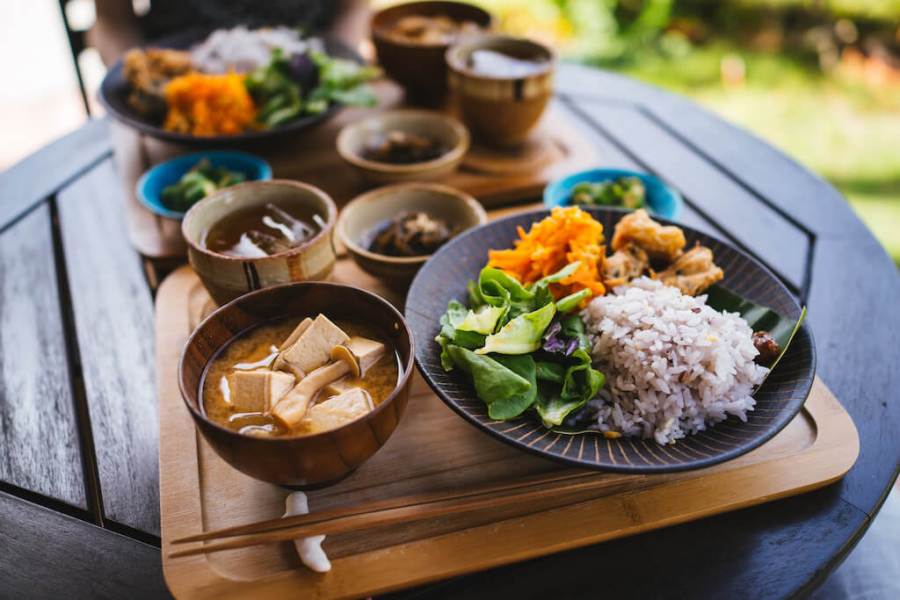The healthiest people, and those most likely to live the longest, can be found in the world’s so-called ‘blue zones’. Their environment, lifestyles and diets are all optimised to give them the highest life expectancies in the world. People in blue zones also have lower levels of chronic disease and obesity.
Related: Cardio Can Change Your Cells To Help You Live Longer
There are five original blue zones:
- Okinawa, Japan
- Ikaria, Greece
- Sardinia, Italy
- Nicoya, Costa Rica
- Loma Linda, California
Blue zones advocate physical activity and healthy eating. The Mediterranean diet, for example, is well-established as one of the healthiest in the world. It’s rich in fish, vegetables, nuts, and healthy fats like olive oil. So it’s no surprise to see Greek and Italian islands in this list. And the blue zone eating method, as a whole, is very similar to the traditional Mediterranean diet.
“The blue zone populations have a ‘plant slant’ approach to their diet, meaning their energy intake comes predominantly from whole, plant foods,” explains Rosie Martin, registered dietician at Plant Based Health Professionals.
“A plant-predominant diet provides abundant low-energy but highly nutrient-dense foods, with additional fibre and phytochemicals that protect our bodies from chronic diseases. These foods help to reduce inflammation, support our ‘good’ gut microbes, manage our weight, improve our mood, and lower the risk for tumour growth.
“A plant-predominant diet doesn’t just add years to your life, it also adds healthy life to those years. Research from the Blue Zones highlights the real-life impact that a plant-predominant diet has on human health and longevity.”

A plant-based breakfast in Okinawa, Japan | Photography: Getty Images
3 ways to follow a blue zones lifestyle
1. Eat less dairy
Dairy products might be packed full of vital vitamins and minerals, but they can also be problematic. It’s well-established that milk and similar products can cause acne. And in a phenomenon aptly named ‘dairy face’, animal products can also cause swollen eyelids, under-eye bags, dark circles and white bumps. It’s good news, then, that dairy substitutes are now just as easy to find as the real thing.
“With 70% of the global population intolerant to cow’s milk, we cannot rely on it as a source of calcium for bone health,” says Rosie Martin. “Luckily, we can get all the calcium we need without it. For those who can tolerate dairy, there are still benefits to choosing a plant-based milk instead. Soya milk fortified with calcium, for example, is a high-protein and low saturated fat option. It also provides extra phytoestrogens and fibre that support a healthy heart.”
2. Limit your sugar
Like dairy, sugar can have an adverse effect on your skin and body. In particular, sugar breaks down collagen, the protein that keeps you fresh-faced and youthful.
“Refined sugar provides a lot of energy that is released quickly into our blood stream,” explains Martin. “This causes a blood sugar spike, shortly followed by a crash as insulin causes your sugar levels to drop. These crashes are coupled with cravings for more sugar, and we are sent into a blood sugar rollercoaster throughout the day. Refined sugar is devoid of any real nutrition.
“You can balance your energy levels by choosing to get unrefined, healthy sugars from whole foods like whole grains, fruits, vegetables and legumes. You can still get your chocolate fix, too, by including dark chocolate in small amounts – a food that is high in beneficial polyphenols.”
3. Get some sun
It’s probably no coincidence that all five blue zones are in warmer climates. Cold weather can affect your mood, dry out your skin and even make you feel more tired. And research shows that 29% of people in the UK are deficient of vitamin D between January and March. This essential vitamin helps the body absorb calcium. When deficient, people can experience low energy levels, depression, headaches and joint pain.
While there are some great substitutes for your vitamin D intake, such as vitamin D supplements and a light therapy SAD lamp, nothing beats the real thing. So make the most of the improving spring weather – or use this as your excuse to spend a week in sunnier climes.








